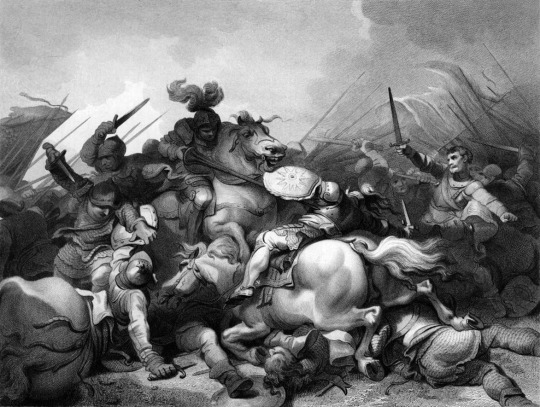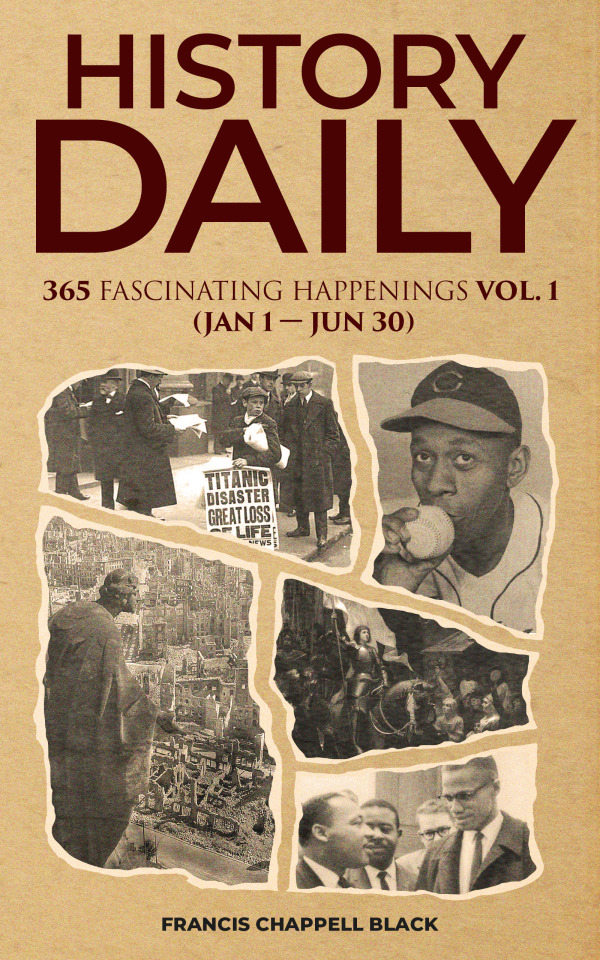#KING HENRY VII
Explore tagged Tumblr posts
Text
What if our armies battled on Bosworth Field against each other hahaha jk… UNLESS

Was gonna save this for August 22nd but i’m an impatient little lass
#king henry vii#henry vii of england#king richard iii#richard III of England#Richard III#battle of bosworth#war of the roses#english history#plantagenets#tudor england#ermmm what the scallop#artists on tumblr#silly drawing#art#digital illustration#richardposting#henryposting
97 notes
·
View notes
Text

Tudor-heirloom
#Tudor England#Elizabeth of York#King Henry VII#authentic#English history#marriage bed#four poster#canopy bed#UK#monarchy#oak furniture#priceless#Tudor dynasty#1486
20 notes
·
View notes
Text
87 notes
·
View notes
Text




Henry’s politic wisdom in governance was singular, his wit always quick and ready, his reason pithy and substantial, his memory fresh and holding, his experience notable, his counsel fortunate and taken by wise deliberation, his speech gracious in diverse languages, his person goodly and amiable, his natural complexion of the purest mixture, his issue fayre and in good number; leagues and confederacies he had with all Christian princes, his mighty power was dread everywhere, not only within his realm but without also, his people were to him in as humble subjection as ever they were to king, his land many a day in peace and tranquillity, his prosperity in battle against his enemies was marvellous, his dealing in time of perils and dangers was cold and sober with great hardiness.”
—Bishop Fisher.
Furthermore, according to Amin, Henry’s reign can be summoned in the following:
��In light of the issues he had with pretenders, his hard-hitting financial policies and restrictive laws designed to curb noble power, it is often overlooked Henry assumed the throne with a serious handicap, having arrived in England a little-known, Welsh-born and Breton-raised protégé of the French regime possessing an inconsequential blood claim to the throne.
No king of England was less suited to rule the country upon their coronation than Henry, a penniless stranger to noble and commoner alike who had no experience of overseeing even a modest estate, let alone a vast and fractured kingdom.
That he was able to reach the end of his reign twenty-four years later in an insuperable position, not only the first English king to avoid overthrow since 1422, but also able to re-establish the strength, wealth, and stability of the crown in the process, was remarkable.
This was not accomplished through luck, but rather sheer hard work, meticulous attention to detail, and an iron-willed determination to outlast any and all rivals before him.”
—Amin, N. “Henry VII and the Tudor Pretenders”. Pp.342.
#tudor dynasty#house of Tudor#the Tudors#Tudors#Tudor#Henry VII#Henry Tudor#Henry VII of England#King Henry VII#King Henry VII of England#historian: Nathen Amin#Tudor edit
50 notes
·
View notes
Text

Subtle foreshadowing?

#art#artists on tumblr#shitpost#traditional art#imgoingtotouchyou#what the flip#richardposting#richard iii#king richard iii#last plantagenet#house of plantagenet#richard plantagenet#house of york#the tudors#tudor era#henryposting#henry vii#king henry vii#battle of bosworth
19 notes
·
View notes
Text

What an interesting observation....when we talk about Elizabeth of York and Henry VII, it's as if they were the perfect romantic marriage but what if that wasn't the case...
Elizabeth was controlled by both her husband and her mother-in-law...
Also perhaps she knew the only way she can survive and live her life well was not to be involved in politics...even if it was at the cost of her family and supporters. At that point, she had children with Henry and had to think about them.
And regardless of how the marriage started, at some point I guess once you have kids with someone, feelings would arise, and Henry being faithful to Elizabeth probably helped with that.
He definitely was in love with Elizabeth, no doubt about that.
4 notes
·
View notes
Text
Secure The Throne|
King Henry VII x Reader
A/N: I’m disappointed that this is my first post on Tumblr. I wrote this after I had the most random dream about King Henry VII, specifically played by Mat. I thought that it was funny so hopefully someone can appreciate it.

“Join our family seat to make my rules secure,” Henry says. We are talking about how he has not yet found a wife to give an heir to the throne. “Henry, are you asking me to marry you?” I ask, shocked. I did not expect this from the conversation. I was just trying to give him advice. Do not get me wrong, I am not opposed to marrying Henry, though the prospect of being queen makes me nervous. On top of that, Henry and I are not courting. Is he asking me as a last resort to secure the throne and give him an heir, or is this something deeper? “Yes. You may not have realized, but I have loved you for a long time. I do hope you feel the same. So, will you marry me?” Henry seems so genuine. I know I want to say yes, but I am frightened. “Do you think that is a good idea?” I ask. “I do not care if it is a good idea, as long as you are my queen.” “Then yes, of course, I will marry you,” I say with a broad smile. Henry has his lips on mine as soon as I finish my sentence. I gasp, as I was not expecting it, but kiss back. Henry puts his hands on my face to deep in the kiss, pushing my back against the door. I put my hands in his long hair, slightly pulling at it before pulling away from the kiss. “Would people not be mad at the fact that you-the King-is kissing me, when we are only newly betrothed?” He grins smugly, “I’m the king; I can do whatever I please. Plus, I would not describe this as just kissing.”
21 notes
·
View notes
Text

And now, we will rule.
You will always be by my side? –King Henry VII
Always.
11 notes
·
View notes
Text
A Royal Tudor Dinner Party: Conversations With The Six Wives Of King Henry VIII - Part Two
#dailyprompt#dailyprompt-1999#history#KING HENRY VII#queens#ROYAL HISTORY#tudor dynasty#TUDOR ERA#tudor history#Tudor queens#womens history#world history
1 note
·
View note
Text
Shropshire




The Henry Tudor Inn in Shrewsbury, Shropshire, is one of the oldest pubs in England.
The building is said to have hosted Henry Tudor (the future Henry VII) during the Bosworth campaign against Richard III in 1485.
Built for the local MP, Hugh Wygan, in the 15th century, tree-ring dating shows that the oldest part is the rear wing, dated to 1426, with the front dated from 1430 to 1431.
The original building included shops, a brewhouse, taproom and accommodation which attracted guests entering the town from the east over the English Bridge.
#Shrewsbury#Shropshire#Tudor Britain#1429#historic#UK#English Inns#half timbered#15th century#King Henry VII
156 notes
·
View notes
Text
They look like their dogs, guys

#ever since I found out about this phenomenon I've been living laughing and loving#ermmm what the scallop#artists on tumblr#silly drawing#art#digital illustration#king Charles II#charles ii of england#charlesposting#richardposting#henry vii#henryposting#king Henry vii#king Richard iii#English history#sfw furry
32 notes
·
View notes
Text

HRex-VII
#King Henry VII#House of Tudor#English monarchs#Tudor era#English history#King Richard III#Wars of the Roses#Yorkists#Lancastrians#dynasty#royal portraits#15th century#1485
12 notes
·
View notes
Text

King Richard III Was Defeated and Killed at the Battle of Bosworth Field, Thus Ushering in the House of Tudor. August 22, 1485
Image: Battle of Bosworth, as depicted by Philip James de Loutherbourg (1740–1812) (Wikimedia Commons.)
On this day in history, in the last battle of the War of the Roses, King Richard III was defeated and killed at the Battle of Bosworth Field by Henry Tudor, the Earl of Richmond. After the battle, the royal crown, which Richard wore into action, was plucked out of a bush and placed on Henry's head. His crowning as King Henry VII initiated the rule of the Tudor dynasty over England, one that would last until Queen Elizabeth died in 1603.
History Daily: 365 Fascinating Happenings Volume 1 & Volume 2 - August 22, 1485
Created of dynastic conflicts within the English Houses of York and Lancaster, the Wars of the Roses began in 1455 when Richard, Duke of York, clashed with Lancasterian forces loyal to the mentally unstable King Henry VI. Fighting continued over the next five years, with both sides seeing periods of ascendancy. Following the death of Richard in 1460, the leadership of the Yorkist cause passed to his son Edward, Earl of March. A year later, with the aid of Richard Neville, Earl of Warwick, he was crowned Edward IV and secured the throne with a victory at the Battle of Towton.
When Edward IV died unexpectedly in 1483, his brother, Richard of Gloucester, assumed the position of Lord Protector for the twelve-year-old Edward V. Securing the young king in the Tower of London with his younger brother, the Duke of York, Richard approached Parliament and argued that Edward IV’s marriage to Elizabeth Woodville was invalid making the two boys illegitimate. Accepting this argument, Parliament passed the Titulus Regius, which saw Gloucester crowned as Richard III. The two boys vanished during this time. Many nobles soon opposed Richard III's reign, and in October 1483, the Duke of Buckingham led a rebellion to place the Lancastrian heir Henry Tudor, Earl of Richmond, on the throne. Thwarted by Richard III, the collapse of the uprising saw many of Buckingham's supporters join Tudor in exile in Brittany.
That Christmas, Henry announced his intention to marry the late King Edward IV's daughter, Elizabeth of York, to unite the Houses of York and Lancaster and advance his claim to the English throne. On April 16, 1485, Richard's wife, Anne Neville, died, clearing the way for him to marry Elizabeth instead.
This threatened Henry's efforts to unite his supporters with those of Edward IV, who saw Richard as a usurper. Richard's position was undercut by rumors that he had Anne killed to allow him to marry Elizabeth, which alienated some of his supporters. Eager to prevent Richard from marrying his prospective bride, Henry mustered 2,000 men and sailed from France on August 1. Landing at Milford Haven seven days later, he quickly captured Dale Castle. Moving east, Henry worked to enlarge his army and gained the support of several Welsh leaders. Alerted to Henry's landing on August 11, Richard ordered his army to muster and assemble at Leicester.
Before leaving France, Henry communicated with Thomas Stanley, Baron Stanley, and his brother Sir William Stanley to seek their support. Upon learning of the landing at Milford Haven, the Stanleys had mustered around 6,000 men and had effectively screened Henry’s advance. During this time, he continued to meet with the brothers to secure their loyalty and support. Arriving at Leicester on August 20, Richard united with John Howard, Duke of Norfolk, and Henry Percy, Duke of Northumberland.
Pressing west with around 10,000 men, they intended to block Henry’s advance. Henry, an inexperienced military leader, turned command of his army over to John de Vere, Earl of Oxford.
After exchanges of arrows, the two forces collided, and hand-to-hand combat ensued. Oxford's soldiers began to gain the upper hand by forming his men into an attacking wedge. With Norfolk under heavy pressure, Richard called for aid from Northumberland. This was not forthcoming, and the rearguard did not move. While some speculate that this was due to personal animosity between the duke and king, others argue that the terrain prevented Northumberland from reaching the fight. The situation was worsened when Norfolk was struck in the face with an arrow and killed.
With the battle raging, Henry decided to move forward with his lifeguard to meet the Stanleys. Spotting this move, Richard sought to end the fight by killing Henry. Leading forward a body of 800 cavalry, Richard skirted around the primary battle and charged after Henry's group. Richard slammed into them and killed Henry's standard bearer and several bodyguards. Seeing this, Sir William Stanley led his men into the fight to defend Henry. Surging forward, they nearly surrounded the king’s men. Pushed back towards the marsh, Richard was unhorsed and forced to fight on foot. Fighting bravely to the end, Richard was finally cut down. Learning of Richard’s death, Northumberland's men began withdrawing, and those battling Oxford fled.
Losses for the Battle of Bosworth Field are not known with any certainty though some sources indicate that the Yorkists suffered 1,000 dead, while Henry’s army lost 100. The accuracy of these numbers is a subject of debate. After the battle, legend states that Richard's crown was found in a hawthorn bush near where he died. Henry was crowned king later that day on a hill near Stoke Golding. Henry, now King Henry VII, had Richard’s body stripped and thrown over a horse to be taken to Leicester. There it was displayed for two days to prove that Richard was dead. Moving to London, Henry consolidated his hold on power, establishing the Tudor Dynasty. Following his official coronation on October 30, 1485, he pledged to marry Elizabeth of York. While Bosworth Field effectively decided the Wars of the Roses, Henry was forced to fight again two years later at the Battle of Stoke Field to defend his newly won crown.

ON SALE NOW!!!
History Daily: 365 Fascinating Happenings Volume 1
In the United States:
History Daily: 365 Fascinating Happenings Volume 1: January – June: Chappell Black, Francis: 9780991855865: Amazon.com: Books
In Canada:
History Daily: 365 Fascinating Happenings Volume 1: January – June: Chappell Black, Francis: 9780991855865: Books – Amazon.ca
#history daily#1400s#War of the Roses#Henry Tudor#King Richard III#Battle of Bosworth Field#King Henry VII
0 notes
Text


“My faithful lords and hardy soldiers who have endured so many dangers with me on land and sea, behold again how against our will we are tested in battle. For the Earl of Lincoln—a treacherous man, as you know—is taking up an unjust cause against me completely unprovoked.”
—Henry VII (1485-1509), when dealing with the Simnel rebellion.
Amin, N. “The Notable Triumph”. Henry VII and the Tudor Pretenders: Simnel, Warbeck and Warwick.
#Henry Tudor#King Henry VII#King Henry VII of England#Henry VII#Henry VII of England#House of Tudor#Tudor dynasty#Tudor England#15th century England#late middle ages#battle of stoke#Sam claffin#Tudor history#Tudor#The Tudors#Tudors
5 notes
·
View notes

